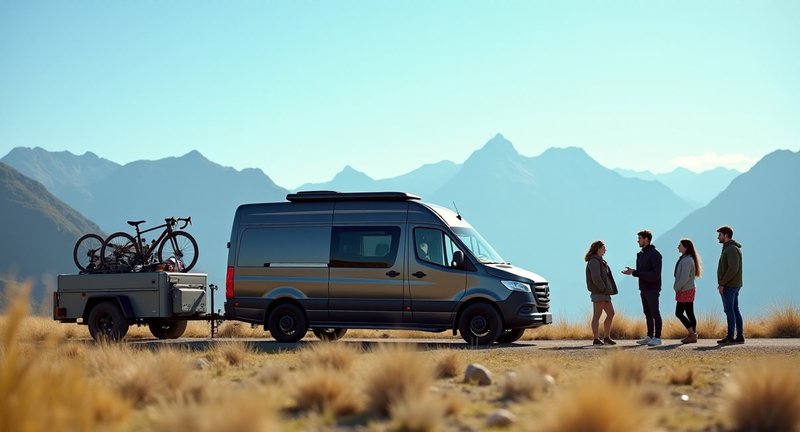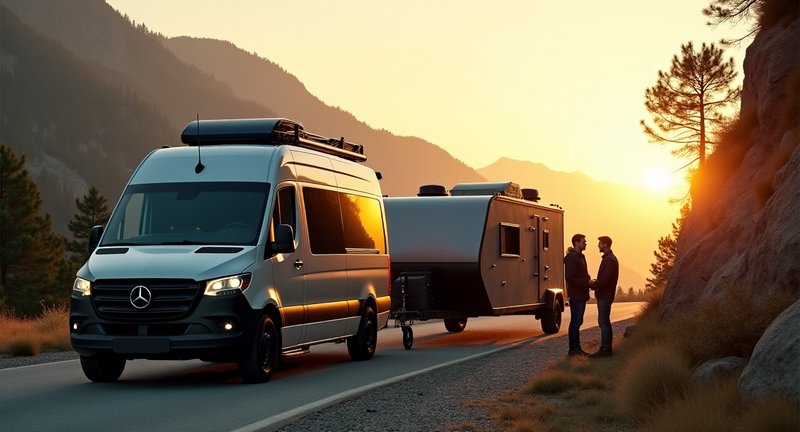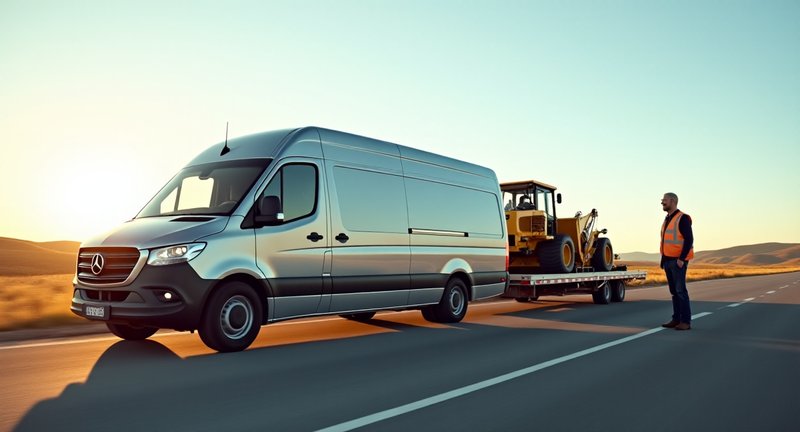Sprinter Diesel Towing Capacity
When you hear about the , you’re likely thinking of long road trips, perhaps pulling a trailer, or even a boat for a weekend getaway. Trust me, I’ve been there. This vehicle is a beast when it comes to towing, and not in the “barely scraping by” sense – it’s built for those who need serious strength on the road.
The first thing that stood out to me with the Sprinter Diesel was its consistency. It doesn’t flinch, whether you’re hauling a lightweight trailer or a hefty load. And when I say hefty, I mean up to 5,000 pounds – that’s some serious muscle. It’s reliable in a way that puts your mind at ease, no matter what you’ve hitched up behind.

Here’s why it works so well:
- Torque for Days: The Sprinter’s diesel engine is packed with torque. You’ll feel that low-end grunt when you’re merging onto the highway or climbing a steep incline with a fully loaded trailer.
- Fuel Efficiency: Diesel engines have a reputation for sipping fuel compared to their gas counterparts, which means fewer stops at the pump while still pulling your load.
- Stability and Control: Even under load, the Sprinter keeps things steady. Its advanced suspension and stability control systems ensure that your cargo doesn’t make the drive a white-knuckle experience.
If you’re the kind of person who needs towing capacity but doesn’t want to sacrifice comfort or fuel economy, this van is a solid choice. The makes weekend warriors, adventurers, and even small business owners feel like they’re ready to take on the world.
Understanding Sprinter Diesel Towing Capacity
When you’re behind the wheel of a powerful van, there’s more to the story than just getting from point A to point B. What really counts is how much extra weight you can carry with you on your adventure. That’s where I often found myself pushing the limits, feeling that deep hum of the engine as it took on heavy trailers or loaded gear.
Over the years, I’ve learned a thing or two about matching up the right van with the right kind of load. Whether you’re heading out on a cross-country trip or just towing a couple of dirt bikes for the weekend, it’s important to know the capacity of your vehicle. You want to be sure you’re in control without overloading the engine or sacrificing safety.
From pulling along boats to heavier construction equipment, I’ve felt that sweet spot where performance meets stability. It’s a delicate dance of knowing what your ride can handle while keeping things smooth on the road. There’s a kind of confidence that comes from knowing your vehicle’s full potential.

Let me tell you, understanding your van’s towing potential isn’t just about numbers or specs. It’s about truly connecting with the vehicle, learning its rhythms, and respecting its limits. When you get it right, it’s like the van and the load become one, moving in perfect harmony down the road.
So next time you’re hooking up a trailer, think about how well your vehicle and cargo are suited for each other. It could be the difference between a seamless trip and a frustrating one.
Introduction to Towing with a Diesel Sprinter Van
Towing with a diesel Sprinter van is an adventure in itself. From personal experience, it’s more than just hooking up a trailer and hitting the road. There’s a certain satisfaction in knowing you’ve got power and efficiency right under your foot.
The first time I towed with a Sprinter, I was impressed by the smoothness. Diesel engines offer that unique low-end torque, which gives you that strong pull without the engine feeling like it’s working too hard. It’s like having a quiet beast beneath the hood.
But here’s the thing – it’s not just about raw power. The stability of the Sprinter makes towing feel almost effortless. You don’t get the nervous sway or jittery ride that some vehicles give when pulling a load. It’s like the van is hugging the road, which makes those long hauls way more comfortable.
I also love how intuitive it is. The engine’s diesel grunt doesn’t sacrifice fuel efficiency. You won’t find yourself stopping at every gas station you pass, which is a game changer when you’ve got a full weekend of travel planned. It’s one less thing to worry about on a big trip.
Whether it’s a boat, a camper, or just a trailer full of gear, this van handles it all with ease. There’s a certain confidence that comes from towing with a vehicle built for the job. And trust me, once you’ve experienced it, you’ll understand exactly what I mean.
How Diesel Engines Impact Towing Performance
As for towing, the diesel engine steps in as your trusty companion, a real game-changer for anyone pulling heavy loads. I’ve spent countless miles behind the wheel of diesel-powered rigs, and let me tell you, the power difference is undeniable.
Diesel engines thrive on torque meaning they deliver that low-end grunt right when you need it, perfect for pulling uphill or accelerating with a load in tow. Unlike gas engines, which often need to rev higher to reach their peak power, diesel engines produce that needed force at lower RPMs. This not only means better towing performance but also less wear and tear on your engine. Here are a few things that stand out when using diesel for towing:
- Superior Torque Delivery: Diesel engines are all about torque, which directly impacts towing. You’ll notice the difference when you take on steep inclines or need to accelerate with a trailer behind you.
- Fuel Efficiency: Diesel engines are more fuel-efficient than their gasoline counterparts, especially under heavy loads. On long hauls, this can save you time, money, and frequent stops at the pump.
- Engine Longevity: Diesels tend to last longer because they’re built tougher. The sturdy construction means they handle the extra stress of towing better, which is a huge benefit if you’re planning to tow regularly.
- Heavy Load Stability: There’s a certain peace of mind when you’re on the highway, and the engine isn’t straining. The stability of diesel power translates into a smoother, more controlled towing experience.
Whether you’re hauling a boat to the lake or a camper for that weekend getaway, a diesel engine feels like it was born for the job. It’s that deep, dependable pull that makes towing less of a chore and more of an effortless glide on the road.
Maximum Tow Load for a Diesel Sprinter Van
Let’s talk about the towing capabilities of the diesel Sprinter van because it’s not just about numbers on a spec sheet, it’s about real-world usability. Having spent years on the road, pulling everything from trailers to boats behind a trusty diesel van, I can tell you that the tow limit is more than a technical figure; it’s a guide for how you approach each journey.
First things first, if you’re planning to hitch up something hefty, you need to consider your total vehicle weight. Factor in not just the load, but also the van’s cargo, passengers, and whatever extras you’ve packed. Here are a few practical insights:
-
Weight Distribution Matters: Spread out the load evenly across your trailer or what you’re towing. It ensures balance and keeps you from swerving, especially on highways.
-
Braking System: A heavy load means your stopping distance increases. It’s worth investing in trailer brakes if you’re pulling anything near the upper weight limit, which can vary based on the van’s year and model.
-
Upgrades for Comfort: If you’re near max load, think about getting a suspension upgrade. Aftermarket air springs or helper springs can help keep the ride smooth and reduce strain on your van’s back end.
-
Fuel Efficiency and Tow Load: With a diesel engine, you get the torque for heavy-duty towing, but remember the more you tow, the more fuel you’ll burn. Plan for more frequent stops.
Towing with a diesel van isn’t just about what’s possible it’s about knowing how to handle the extra weight, ensuring everything from your load to your passengers stays safe.
Comparing Sprinter Van Models for Towing
In relation to choosing a Sprinter van for towing, I’ve been down that road myself (no pun intended). It’s all about finding the right balance of power, payload, and features to make sure your van is up for the challenge. Let’s walk through some of the models and what they bring to the table when towing is the main priority.
First off, not all Sprinter vans are built equal, and their ability to handle a heavy load varies quite a bit. Here’s what I’ve learned when comparing them:
Key Factors to Consider:
- Engine Power: The more horsepower under the hood, the better your van will manage steep inclines and longer hauls. Look for turbocharged options, which often offer the best mix of power and fuel efficiency.
- Wheelbase: Longer wheelbases typically provide greater stability when towing heavier loads, but they also impact maneuverability, especially in tighter spaces.
- Suspension and Handling: Models with reinforced suspension systems offer smoother rides, even when pulling a trailer. Stability control and adaptive cruise can also be game-changers for long-distance trips.
- Braking Systems: A model equipped with high-performance brakes and trailer sway control features is ideal. Trust me, when you’re towing a hefty load, you’ll be glad for the extra braking support.
A few standout options? The 2500 models handle moderate towing tasks well, but if you’re dealing with bulkier loads, the 3500 or 4500 series are absolute workhorses. They’ve got the muscle to haul significant weight without compromising on performance. From my experience, the higher-tier models also come with enhanced driver assistance features that make towing a breeze.
Choosing the right van for towing isn’t just about the specs on paper. Think about the kind of terrain you’ll cover and whether you’ll need those extra bells and whistles. Trust me, your future self will thank you.
Engine Specifications That Affect Towing Capabilities
When it comes to towing, not all engines are created equal. From my own adventures on the road, I’ve learned that understanding engine specifications can truly make or break your towing experience. The capability of a vehicle to haul heavy loads hinges on several key factors, which I’ve found to be quite enlightening.
Key Engine Specifications Influencing Towing:
-
Horsepower: The engine’s horsepower dictates how much work it can perform. Higher horsepower means your vehicle can pull more weight without straining.
-
Torque: Often overshadowed by horsepower, torque is crucial for towing. It’s the twisting force that helps get heavy loads moving, especially from a standstill.
-
Transmission Type: Whether it’s automatic or manual, the transmission plays a pivotal role in how power is delivered to the wheels. A good transmission can make towing smoother and more efficient.
-
Cooling Systems: Towing puts extra stress on your engine, and a robust cooling system ensures that it can handle the heat. Make sure your vehicle is equipped with an adequate radiator and coolant capacity.
-
Gear Ratios: Different gear ratios can enhance towing performance by optimizing engine power output. Lower ratios can improve torque for heavy loads, while higher ratios may boost fuel efficiency.
From my experiences, the right combination of these specifications can transform an ordinary road trip into an exhilarating journey, effortlessly hauling trailers or camping gear. So, the next time you’re considering a vehicle for your adventures, remember to look under the hood those numbers matter. And trust me, when you’re cruising down the highway with everything you need in tow, you’ll be grateful for a little extra power and performance.
Understanding Torque and Its Role in Towing
Understanding torque in the nature of towing is akin to uncovering a hidden treasure map. It’s not just about the weight you’re hauling; it’s about the force that propels your vehicle forward with ease. In my experience, when you grasp the nuances of torque, you unlock a world of possibilities for your towing adventures.
Torque is the rotational force produced by the engine. Imagine it as the muscle behind the wheels. The more torque your vehicle can generate, the more effortlessly it can move heavier loads. It’s like having a well-trained companion that helps you conquer steep hills or navigate tight turns with grace.
When I first ventured into towing, I underestimated how crucial torque was. Picture this: I was pulling a trailer filled to the brim with gear, and as I approached a steep incline, I felt a familiar twinge of anxiety. But then, the engine roared to life, and the torque kicked in. Suddenly, the hill felt like a mere bump in the road, and I was cruising like a pro.
The beauty of torque lies in its ability to deliver consistent power, regardless of the terrain. Whether you’re on a flat highway or tackling rugged trails, it’s your vehicle’s torque that ensures you maintain control and stability. I’ve learned that understanding this dynamic can transform your towing experience from daunting to exhilarating.
So, next time you hook up a trailer, take a moment to appreciate the torque working tirelessly behind the scenes. It’s your trusty ally, making each journey smoother and more enjoyable.
Towing Safety Tips with Diesel Sprinter Vans
Towing safety is a vital consideration when hitting the road with Diesel Sprinter Vans. I’ve learned that understanding your Sprinter Diesel Towing Capacity can be the difference between a smooth journey and a bumpy ride.
First, it’s essential to know the numbers. Each Sprinter model has its own towing specifications, and they vary depending on the engine and configuration. A quick glance at your owner’s manual can reveal those juicy details.
Next, let’s talk about weight distribution. When you’re towing, balance is key. An uneven load can lead to swaying, which is the last thing you want while cruising down the highway. I always double-check my hitch and load to ensure everything sits just right.
Braking is another crucial aspect. The weight of what you’re towing can significantly impact your braking distance. I remember one time I underestimated how quickly I needed to stop, and let me tell you, it wasn’t pretty.
It’s wise to keep an eye on your mirrors. Visibility can be compromised when towing a trailer, so adjusting your mirrors properly is a must. I often find myself doing a quick mirror check to make sure I’m aware of my surroundings.
Also, make sure to take breaks during long hauls. Driving a Sprinter while towing can be more tiring than you think. Stop, stretch, and recharge it helps maintain focus and ensures a safer journey.
Sprinter Diesel Towing Capacity: An Insightful Deep Dive
In the context of the robust world of diesel-powered vans, few can match the sheer potential of a Sprinter. In my travels, I’ve found that these workhorses excel not only in carrying passengers but also in hauling substantial loads with surprising ease.
Imagine cruising down the highway, the engine humming a reliable tune while you’re confidently pulling a trailer packed with gear. The van’s impressive torque makes navigating steep hills feel like a walk in the park, almost as if the weight behind you is nothing but a feather.
One of my favorite aspects of this vehicle is its versatility. Whether you’re hauling camping gear for a weekend getaway or transporting equipment for a business venture, it adapts seamlessly. I’ve loaded it up more times than I can count, and each time, it has handled the task with grace.

Let’s not forget about the peace of mind that comes with having a sturdy vehicle. Knowing that I can rely on my Sprinter to tackle any towing job means I can focus on the adventure ahead. It’s like having a trusty sidekick that never falters, regardless of the challenge.
So, if you’re contemplating a journey that requires some serious hauling, consider how this dependable van can elevate your travel experience. It’s not just about getting from point A to point B; it’s about enjoying the journey while knowing you’ve got the right tools for the job.
Importance of Proper Weight Distribution When Towing
When embarking on a towing adventure, the importance of proper weight distribution cannot be overstated. Having towed my fair share of trailers, I can tell you that an unbalanced load can turn a smooth journey into a wobbly, nerve-wracking experience. Here’s what I’ve learned about keeping that balance right:
-
Know Your Limits: Always start with a clear understanding of your vehicle’s weight limits. Each vehicle has its unique specifications, and exceeding them can lead to disasters. Check your owner’s manual and follow the guidelines provided.
-
Load Placement Matters: Positioning your cargo correctly is crucial. Here’s a simple guideline:
- Heaviest Items: Place them low and toward the front of the trailer. This helps maintain stability.
- Lighter Items: These should be secured at the back. However, avoid overloading the rear, as it can lift the front of your towing vehicle, leading to poor steering and braking.
-
Use Weight Distribution Hitches: These nifty devices can make a world of difference by evenly distributing the weight across the vehicle and trailer axles. They help minimize sway and improve control on the road.
-
Regular Checks: Before hitting the road, do a walk-around inspection. Ensure that the load is secure and that the tires are properly inflated. This simple act can save you from unforeseen troubles.
-
Adjust on the Go: If you sense your vehicle swaying or if steering feels off, don’t hesitate to pull over. Adjust the load if necessary your safety is paramount.
With experience comes wisdom, and trust me, a well-balanced load will not only make your journey more enjoyable but also ensure the safety of you and others on the road.
Towing Efficiency: Fuel Economy with Diesel Vans
In relation to towing efficiency in diesel vans, I’ve found that nothing quite compares to the synergy of power and fuel economy. Driving a diesel van for towing is like having a trusty steed; it’s robust and ready for the journey, all while being surprisingly gentle on your wallet at the pump. Let’s dive into some key considerations that elevate this experience.
Fuel Efficiency Tips for Diesel Van Towing
-
Aerodynamic Design: The shape of your van can greatly influence fuel consumption. Opt for streamlined accessories that reduce drag, such as aerodynamic roof racks or streamlined trailers.
-
Weight Management: Every pound counts. Ensure you’re not overloading your van; a well-balanced load means less strain on the engine and improved fuel efficiency.
-
Tire Pressure: Keep those tires inflated to the recommended levels. Under-inflated tires can create unnecessary resistance, which translates to increased fuel consumption.
-
Driving Habits: Smooth driving is crucial. Gradual acceleration and deceleration not only protect your van’s engine but also help maximize fuel economy. Avoiding rapid starts can yield surprising savings over time.
-
Regular Maintenance: Schedule regular check-ups. A well-maintained engine runs more efficiently. Keep an eye on filters, oil changes, and other essentials to ensure optimal performance.
Towing with a diesel van is more than just a means to an end; it’s an experience steeped in practicality and adventure. I’ve often marveled at how much I can carry without sacrificing comfort or efficiency, all while enjoying the ride. So, the next time you’re considering a towing endeavor, think diesel it just makes sense!
Towing with a Loaded Cargo Van: What to Consider
Regarding towing with a loaded cargo van, there are several nuances that can make or break your journey. From my personal escapades on the open road, I’ve learned a thing or two about what to consider before hitching up and hitting the gas. Here’s a rundown of essential factors to keep in mind:
-
Weight Distribution: Ensure your load is evenly distributed to maintain balance. An unbalanced load can turn a pleasant ride into a perilous adventure.
-
Braking System: Upgrading your braking system might feel like an unnecessary expense, but trust me, it’s a lifesaver. Enhanced brakes help manage that extra weight and ensure a smooth stop.
-
Tire Pressure: A little attention to tire pressure can go a long way. Properly inflated tires provide better handling and fuel efficiency, making your towing experience more enjoyable.
-
Engine Performance: Don’t underestimate the power of a robust engine. A van that roars with confidence can handle steeper grades and heavy loads without breaking a sweat.
-
Legal Regulations: Different regions have varied towing regulations. Familiarize yourself with local laws to avoid unwelcome surprises.
-
Road Conditions: Keep an eye on the weather and road conditions. Slippery roads or steep inclines can change your driving dynamics significantly.
Embarking on a towing journey with a loaded cargo van is not just about hooking up and rolling out. It’s an art that combines preparation, caution, and a pinch of adventure. So, gear up, plan ahead, and enjoy the ride!
Trailer Hitch Requirements for Sprinter Diesel Vans
When dealing with traveling with a Sprinter diesel van, understanding trailer hitch requirements is crucial. Based on my own experiences navigating through the winding roads and picturesque landscapes, I’ve learned that having the right equipment can make or break your adventure. Here are some key points to consider:
-
Hitch Class: Choose a hitch class that suits your travel needs. Generally, for heavier loads, a Class III or IV hitch is your best bet. It’s robust and designed to handle more weight, making it a reliable companion on your journeys.
-
Weight Distribution: Don’t underestimate the importance of weight distribution systems. They help in leveling the vehicle and distributing the weight evenly, ensuring a smoother ride. Trust me; you’ll appreciate the stability, especially on long trips.
-
Electrical Connections: Don’t forget the electrical wiring! Your trailer lights need to sync with your van’s lighting system. A 7-pin connector is often recommended, as it handles multiple functions, including brake lights and turn signals.
-
Brake Controller: If you plan to tow a trailer with brakes, investing in a brake controller is essential. This device provides better control and responsiveness while towing, allowing you to stop safely and confidently.
-
Check Local Regulations: Also, familiarize yourself with local towing regulations. Some states have specific requirements regarding hitch installations and weight limits. A little research can save you from potential fines or issues down the road.
Navigating these trailer hitch requirements is an adventure in itself. When you equip your Sprinter van properly, you open the door to a world of exploration one that’s waiting for you to discover!
Maintenance Tips for Towing with Diesel Vans
In relation to towing with diesel vans, a touch of preventative maintenance can save you a world of hassle down the road. I’ve learned through experience that regularly checking your fluid levels can make a significant difference.
Oil is the lifeblood of your engine, and keeping it fresh ensures your van performs optimally. Don’t forget about the transmission fluid; it’s crucial for smooth towing and can prevent costly repairs later.
Next, let’s talk about tire pressure. Trust me, you don’t want to be dealing with a flat in the middle of nowhere. Keeping your tires properly inflated not only enhances fuel efficiency but also provides better control when towing heavier loads.
Brake systems deserve special attention too. I’ve had my share of close calls due to inadequate braking power. Regularly inspecting your brake pads and fluid levels can make a dramatic difference, especially when you’re hauling extra weight.
Another tip I picked up is to pay attention to your cooling system. Towing puts extra strain on your engine, so keeping the radiator and coolant levels in check is vital. An overheated engine can turn a weekend adventure into a roadside nightmare.
Also, I always recommend giving your van a thorough inspection before hitting the road. Look for any signs of wear and tear, especially on the hitch and wiring. After all, the last thing you want is for something to go wrong while you’re out exploring the great outdoors.
Keep these maintenance tips in mind, and you’ll be well on your way to enjoying the freedom that comes with towing your dreams.
Q&A Corner
Which Mercedes Sprinter can tow 7500 lbs?
The Mercedes-Benz Sprinter 3500 series is capable of towing up to 7,500 lbs when properly equipped. This model is ideal for those needing a robust vehicle for heavy-duty tasks, making it suitable for commercial use or transporting larger trailers. To achieve this towing capacity, ensure you opt for the right towing package that includes features such as a heavy-duty hitch and adequate braking systems for safe and efficient towing.
What is the towing capacity of the Mercedes Sprinter 3.0 V6 diesel engine?
The Mercedes Sprinter equipped with the 3.0 V6 diesel engine offers impressive towing capabilities, with a maximum towing capacity of around 7,500 lbs when fitted with the correct towing options. This powerful engine is designed to handle heavy loads, providing both performance and efficiency, making it a popular choice for businesses and individuals needing a reliable towing vehicle. It’s essential to verify your specific configuration to ensure you meet the towing requirements.
How much weight can a 3500 Sprinter pull?
The Mercedes Sprinter 3500 can pull a maximum of approximately 7,500 lbs when adequately equipped with a towing package. This capability allows the van to manage various heavy loads, whether for transporting trailers, boats, or other sizable equipment. Always consider the total weight of the cargo, including any additional equipment or passengers, to ensure safe towing practices and compliance with manufacturer guidelines.
What is the maximum towing capacity of a Mercedes Sprinter?
The maximum towing capacity of the Mercedes Sprinter varies based on the specific model and engine configuration. Generally, the Sprinter can tow anywhere from 5,000 to 7,500 lbs, with the higher end available in models like the 3500 equipped with the V6 diesel engine. To maximize towing performance, it’s crucial to select the appropriate options and packages, including a heavy-duty trailer hitch and enhanced braking systems, to ensure safety and efficiency.
What van can tow 6000 lbs?
Several vans are capable of towing 6,000 lbs, with the Mercedes-Benz Sprinter 2500 being a notable option. This model can effectively manage moderate towing tasks, making it suitable for various applications, from hauling trailers to transporting equipment. Additionally, many full-size cargo vans from other manufacturers also offer similar towing capabilities, providing consumers with various choices to fit their specific needs.
What is the max weight a sprinter van can haul?
The maximum weight a Sprinter van can haul, or its payload capacity, can range significantly based on the model and configuration. For example, the Mercedes Sprinter 3500 can have a payload capacity of up to 6,000 lbs, allowing it to carry substantial loads efficiently. However, factors such as the van’s specific options, dimensions, and additional features can affect the payload, so it’s vital to consult the manufacturer’s guidelines to ensure compliance with weight limits.
What is the towing capacity of the 3.0 L V6 turbo diesel engine?
The 3.0 L V6 turbo diesel engine in the Mercedes Sprinter provides exceptional towing capacity, reaching up to 7,500 lbs when combined with the appropriate towing package. This engine is designed for optimal torque and efficiency, making it an excellent choice for those who require reliable towing for heavy loads. It’s crucial to ensure your vehicle is equipped with the right hitch and brake systems to safely manage these weights.
How many miles per gallon does a Mercedes Sprinter diesel get?
The fuel efficiency of a Mercedes Sprinter diesel varies by model and driving conditions, but on average, it typically achieves around 22 to 25 miles per gallon (mpg). This efficiency makes it an economical choice for businesses and individuals who rely on long-distance travel or frequent usage. Factors such as load weight, driving habits, and maintenance can influence fuel economy, so regular servicing and mindful driving can help maximize mpg.
Which cargo van has the highest towing capacity?
The cargo van with the highest towing capacity is typically the Mercedes-Benz Sprinter, specifically the 3500 model, which can tow up to 7,500 lbs when properly equipped. Other notable contenders include the Ford Transit and Ram ProMaster, but the Sprinter often leads in maximum towing capability due to its robust engine options and engineering. Choosing a van for towing should consider not only capacity but also safety features and overall reliability.
What is the towing capacity of the Mercedes Sprinter motorhome?
The towing capacity of a Mercedes Sprinter motorhome largely depends on its specific configuration and model year. Typically, these motorhomes can tow between 5,000 to 7,500 lbs, making them suitable for towing trailers, boats, or vehicles. It’s essential for potential buyers to review the specifications of the particular motorhome they are interested in, including its weight and the features of the towing package, to ensure safe towing practices.
What is the towing capacity of the Sprinter 2.0 gas engine?
The towing capacity of the Sprinter equipped with the 2.0-liter gas engine generally ranges from 5,000 to 6,000 lbs, depending on the specific model and configuration. This engine offers a balance of power and efficiency, making it a viable option for those who require moderate towing capabilities. Always confirm the towing options available and ensure that the vehicle is equipped with the necessary features to safely handle the intended loads.
Which Mercedes is good for towing?
The Mercedes-Benz Sprinter is widely regarded as one of the best options for towing among the Mercedes lineup, particularly in its 3500 configuration. With robust engine choices and towing capacities reaching up to 7,500 lbs, the Sprinter excels in handling heavy loads. Other Mercedes models, such as the G-Class SUV, also offer respectable towing capabilities, but the Sprinter is specifically designed to meet the demands of towing, making it a top choice for this purpose.











This is spot on! I’ve been towing with my Sprinter for a couple of years now, and understanding towing safety has saved me from a few close calls. The bit about weight distribution is SO important I always double-check how my gear’s packed after a scary sway incident on the highway once. And yes, those mirrors are a lifesaver! Every time I set off, I adjust them and make sure my visibility is solid, especially with a larger trailer in tow. I also can’t stress enough how taking breaks keeps you sharp. Towing can be exhausting, and that extra focus is key to staying safe on the road.
Couldn’t have said it better myself! Torque really is that unsung hero in towing. I remember feeling the exact same thing when I started – the first time I felt the torque kick in on a hill, I realized how vital it is. It’s like having an invisible force pulling you along, even when the going gets tough. The more I’ve learned about it, the more I appreciate what a game-changer it is for towing. Nothing beats that feeling of smooth, controlled power when hauling a load!
Absolutely agree! I learned the hard way how crucial those engine specs are when I attempted to tow a camper with an underpowered vehicle. It was a stressful trip, constantly worrying about overheating. Since then, I make sure to check horsepower and torque before even considering what I’ll haul. I’m all for taking the time to match your vehicle to the load, especially if you want a smooth, carefree adventure. The right engine really can make all the difference!
You nailed it when discussing the balance of power and payload in choosing a Sprinter van for towing! I had a blast comparing different models a while back, and I learned firsthand how much engine power can affect your towing experience. The turbocharged engines really do pack a punch, making those uphill climbs feel like a breeze. And oh, the wheelbase! I had a shorter one before and maneuvering through tight spots was a bit of a challenge. The longer wheelbase offers that extra stability, but it’s a trade-off for tight turns. I totally agree with your point about braking systems, too; nothing is scarier than feeling your load sway because you’re not adequately equipped. I can’t emphasize enough how those high-performance brakes are worth their weight in gold when you’re towing something hefty. Your thoughts on driver assistance features are spot on as well! They make such a difference on long trips. Thanks for sharing these insights; they’ve definitely sparked some
Ah, the towing capabilities of the diesel Sprinter van! Your experience echoes mine. It’s refreshing to see someone emphasize the real-world application of towing limits rather than just numbers on a page. I’ve towed everything from trailers to race cars with my diesel van, and weight distribution is absolutely key! I remember one trip where I underestimated the load; the swaying was nerve-wracking. You’re spot on about investing in a braking system trailer brakes can literally save your life. Upgrading the suspension was a game-changer for me too. I added air springs, and wow, it smoothed out the ride incredibly, especially with a heavy load. Your mention of fuel efficiency also resonates; the more I tow, the more I realize how important it is to plan my fuel stops. It’s not just about the power; it’s about the entire towing experience! Knowing how to manage the weight ensures a safe and enjoyable trip for everyone. Thanks for sharing such valuable insights; it’s cruc
I couldn’t agree more with your take on diesel engines for towing! It’s like having a superpower when you’re on the road, especially when you’re dealing with heavy loads. I remember my first time towing a camper switching from gas to diesel was a game-changer. The torque you mentioned is so noticeable; it feels like the engine just grabs the road and pulls without breaking a sweat. Plus, I love how diesel engines are built for the long haul, literally! It’s almost comforting knowing that with proper maintenance, they’ll stick around for years, allowing for countless adventures. The fuel efficiency is another huge plus who doesn’t want to spend less time at the pump? I often find myself smiling as I glide past gas stations while others are refueling. Your points about heavy load stability hit home, too. I’ve felt that reassuring sense of control while towing, and it makes all the difference, especially on steep hills. Thanks for sharing these insights; they really resona
Absolutely! Towing with a diesel Sprinter is a unique experience. I love how effortless it feels, especially on long trips. The way it hugs the road is reassuring! Fuel efficiency is a huge plus for those weekend getaways. I can focus on the adventure instead of constantly stopping for gas. Cheers to more road trips!
What a great reminder about the importance of knowing your vehicle’s capabilities! I’ve definitely pushed my van a bit too far in the past, only to regret it later. Finding that perfect balance between weight and control makes all the difference on a road trip. I remember towing a trailer full of dirt bikes, and it was incredible how smoothly everything went once I understood my van’s limits. You’re spot on about the connection with the vehicle; it’s all about building that trust and confidence, right? Each adventure teaches us something new about our rides, and respecting those limits can lead to some amazing journeys. Happy towing!
I couldn’t agree more! The Sprinter Diesel is indeed a game changer for anyone who loves hitting the road with a trailer in tow. I recently took mine on a weekend trip to the mountains, and I was blown away by how effortlessly it handled my 5,000-pound boat. The torque is unreal; merging onto the highway felt like a breeze, even with that load behind me. Plus, the fuel efficiency is a fantastic bonus! It’s like the van just knows what it’s doing. The stability and control you mentioned truly transform the driving experience no white-knuckle moments here! It makes long drives so much more enjoyable when I don’t have to worry about my cargo bouncing around. If you’re considering a van for towing, I can’t recommend the Sprinter enough. It really does feel like you’re ready to conquer any adventure life throws your way!